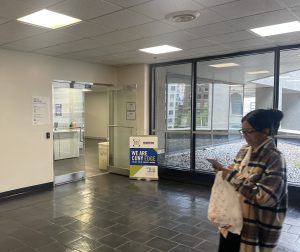Like its commuter student population, Hunter advisors are as hard to track down. Hafsha Rahman, a human biology major, reports that she had to wait up to one week to see her general advisor about a question regarding her degree works– she ultimately had to turn to her department major advisor for help.
This experience isn’t unanimous though. Advisors are readily available for students in honors programs like Macaulay. A quick comparison shows four active advisors for Macaulay Honors’ 480 students and 15 active advisors for the rest of Hunter’s 24,052 students. Students with special cases, like transfer students or athletes, have their own advisors.

Hunter’s advising system creates a dynamic that makes students feel like they need to be “special” to receive help.
For some students, their biggest motivation for joining an honors program is to have access to an advisor. But, even then, these honors programs are not an option for all students– transfer students are barred from being considered.
“I’m my own advisor,” said Ray DePaul, a transfer political science major, “I heard all the horror stories and just didn’t find it worth it to wait for passive-aggressive treatment. I didn’t really have the choice since I couldn’t qualify for an honors program.”
These feelings are shared across platforms that Hunter students use to vent and socialize. One Reddit user, zXHerpaDerpXz, writes on r/HunterCollege “Bro who even is your guy’s advisor? When I emailed mine I got an automated response saying she quit. I ended having to solve my own issues because these advisors really are useless.” zXHerpaDerpXz was unresponsive when reached out for comment.
The quality of advising problem can be attributed to low pay. With the Director of Advising reportedly only making $116,724 in 2022, these advisors are overworked with large student loads. Speaking with Director Nikole Feliciano, she confirmed that each advisor has a caseload of 800 students, grouped by major clusters of A for science and nursing, B for arts and humanities, and C for social sciences, technology, and mathematics.
Looking at the website, this advising structure isn’t clear, with the site listing 11 directors for the advising office, with the majority vaguely titled and missing a picture. In addition, Director Feliciano shared that the office lost two advisors, due to extraneous situations like maternity and relocation, and an associate director, which can’t be filled due to the CUNY Freeze put into place on February 11, 2023.
While students tend to prefer to rely on their department major advisors, Director Feliciano emphasizes that the advising office works closely with both the Pre-Professional advising and department major advising, and should be seen by students as a support system. “We like to think of ourselves as a triple network, where you will have an advisor that is in the Office of Advising, you can have an advisor in prehealth, prelaw, and prebusiness if you chose, and then you also have support from the department,” said Feliciano.
Aside from access, students need to be made aware of where the advising office is and how they can schedule appointments. Speaking with 20 students on the fifth floor of the Leon & Toby Cooperman Library, more than half were unsure where the office was, and how to use the college’s system, Navigate, to book an appointment.
So, the problem extends beyond just a lack of staffing and funding. Students are generally unaware of the resources the office has to offer. The Office of Advising’s website lists dates and times for in-person walk-in visits and virtual Zoom visits.
While Director Feliciano shared that campaigns are done frequently to encourage students to visit the office, the lack of awareness held by students stems from the fact that Hunter doesn’t mandate regular students to meet with their advisors unlike the honors program, which do. With no rules mandating meeting with one’s advisor, students can easily get lost with all the information consistently thrown at them by Hunter.
Hunter’s advising system creates a “survival of the fittest” environment, where students in honors programs are adequately supported while those who aren’t are left to fend for themselves.

